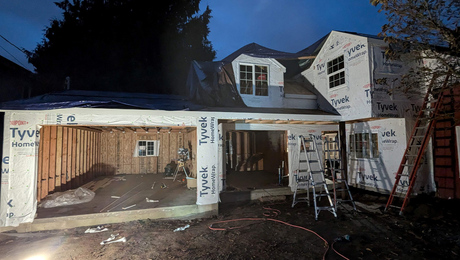Quite often when doing residential renovating, we have to turn off branch electrical circuits to do our stuff. If the panel is labelled properly, it’s no big deal to locate the appropriate breaker and shut the circuit down. More often than not, the breaker directory will be either obliterated, or not present at all. You can flip through them individually until you find yours, or you can short out the hot wire to ground, which should pop the right breaker. My question is, is this technique kosher? Is there a less dramatic way of finding and shutting the right circuit down. ( I hate the shower of blue sparks.)
Cheers,
Erwin















Replies
I've got a little checker that either plugs in, or screws into a light socket, that inserts a signal on the live line. Then you go to the panel, and wave another little jigger over it and it beeps or a light comes on when you get to the right one - or maybe right next to it.
I could dig it out for the name if you're interested.
Forrest
Mine is a cheap one, about thirty dollars. The sending unit plugs into an outlet. There are no switches or adjustments on it. If the outlet is hot, a red LED lights and it sends a warbling RF tone on the hot. The receiver unit is compact and has a sensitivity-on/off switch. I run that across the face of the breakers and it emits an audible tone when it finds the RF. It usually will "sing" on four or five breakers. I turn down the sensitivity until I locate the correct one. I flip that breaker, turn up the sensitivity and verify the sound has ceased. Before working on the wiring, I verify that the LED on the sending unit is extinguished. I also double-check with my test-o-light just to be sure. I got it at a big box and it is cheaper than replacing breakers that your old method is going to weaken/ruin. Be safe - good luck.
I'd be interested to know the manufacturer and name of this tool as I am interested in obtaining one, sounds very useful. Thanks.
Circuit Breaker Finder or Circuit Breaker Tracer.Google will find them. There are a number of brands.http://www.drillspot.com/products/69196/METERMAN_ECB50_TracerCircuit-Breaker?s=1
http://www.professionalequipment.com/xq/ASP/ProductID.3278/id.5/subid.269/qx/default.htm
http://www.bizrate.com/electricalsupplies/mid23/oid424727025__keyword--electrical+tools.html
http://www.zircon.com/sellpages/scanandsensor/CF12/CF12.html
http://www.amazon.com/Zircon-58985-Circuit-Breaker-Finder/dp/B00006JKXK
http://www.circuitdetective.com/
http://www.toolup.com/productinfo.asp?ID=CS-2072&Man=Greenlee&pid={006E1FEB-727C-4238-8AEA-C3872E35B763}
The home horror stores will carry soem of these.
http://www.nextag.com/circuit-breaker-finder/search-htmlNote - these require a hot circuit to work.
The listing below also includes other types of tracers.http://www.professionalequipment.com/circuit-tracers/
Both units (transmitter and receiver) of mine are yellow. Mine may be discontinued. If I were to do it all over, I'd probably get theAmprobe Circuit Breaker Tracer
Item #: C503-4120
Manufacturer: Amprobe
Manufacturer Item #: BT-120
Product Type: Circuit Tracers
Price: $69.95
This technique is not a good idea, for many reasons, here's one more. In old houses with fuses, I've read somewhere that some folks when they burn a fuse and don't have a replacement at hand, jam some metallic object in there (like a coin) to close the circuit and go on with their business, with the assumption that they'll replace it with the real thing later. Then forget about it. Your trick when done to such a circuit could cause a real problem.
That's true (what you read). My Dad used to keep a stock of 15,20,30 amp coins on hand.